
📝 DESCRIPTION
[Show/Hide]
Myers-Briggs Type Indicator – MBTI
The most well-known and globally used character assessment questionnaire, based on the Myers-Briggs Indicator (MBTI), reworked and customized by The Spiritual Seek staff. This version is the world’s fastest and shortest, In fact it only counts 4 questions and has an execution time under 3 minutes. The results are fairly accurate. In case you are not satisfied with the final profile, we suggest that you restart the test by clicking on the appropriate link and use the function called Ask me a different question , so that you can answer new questions and further refine the computation of your result.
4 Pairs of Personality Traits
The acronyms identifying the various character profiles are composed of 4 pairs of elements combined:
Introversion-Extraversion (I-E)
Sensing-Intuition (S-N)
Thinking-Feeling (T-F)
Judging-Perceiving (J-P)
An example: INFJ – The Advocate
(Introversion-Intuition-Feeling-Judging)
16 Potential Personality Combinations
There are 16 possible combinations, and each profile has distinctive character traits, strengths and weaknesses. This type of personality assessment test is widely used in Anglo-Saxon societies, with particular regard toward the evaluation of professional aptitude, i.e., in personnel selection and in choosing the most suitable job for each individual.
INTROVERSION vs. EXTRAVERSION
1. Do you like being around people and socializing?
A. Not at all, I feel discomfort
B. Very much, it makes me feel alive
INTROVERSION vs. EXTRAVERSION
1.1 Do you think you have many real friends, say at least 8-10?
A. Yes, at the very least
B. I don’t have any friends
INTROVERSION vs. EXTRAVERSION
1.2 Being the center of attention makes you feel generally:
A. Uncomfortable
B. At ease
INTROVERSION vs. EXTRAVERSION
1.3 Do you ever feel the need to have moments of solitude?
A. Never or almost never
B. Quite often
SENSING vs. INTUITION
2. When a decision has to be made, what approach do you prefer?
A. I mostly follow my gut and sixth sense
B. I gather information and analyze the situation
SENSING vs. INTUITION
2.1 How do you approach an unknown phenomenon?
A. I mainly focus on the feelings it arouses in me
B. I try to rationally understand what it is about
SENSING vs. INTUITION
2.2 Do you find interesting theoretical discussions, such as the explanation of a natural phenomenon?
A. No, not at all
B. Yes, enough or a lot
SENSING vs. INTUITION
2.3 Are you curious about the functioning of objects?
A. No, as long as they work
B. Yes, I like to understand how they work
SENSING vs. INTUITION
2.4 Regarding Philosophy, choose the statement you most agree with:
A. It is generally boring and not useful
B. It can bring interesting food for thought
THINKING vs. FEELING
3. Someone falsely accuses you of telling a lie, what is your first reaction?
A. I get angry and raise my voice
B. I explain my point of view lucidly
THINKING vs. FEELING
3.1 How important are emotions in your life?
A. They are fundamental: I live by emotions
B. Not much: I try to be rational
THINKING vs. FEELING
3.2 Do you ever act impulsively and hastily?
A. Yes, quite frequently
B. Never or almost never
THINKING vs. FEELING
3.3 Do you easily get emotional when watching a movie or reading a book?
A. Yes, I empathize a lot
B. Never or almost never
JUDGING vs. PERCEIVING
4. Are you a person who changes opinions easily?
A. No, I never change my opinion
B. Yes, I often revise my opinions
JUDGING vs. PERCEIVING
4.1 Do you use to plan your life in the medium to long term, such as for the next 5-10 years?
A. No, I prefer to live day by day
B. Yes, I am a far-sighted and organized person
JUDGING vs. PERCEIVING
4.2 Do you ever question your ideas or beliefs?
A. No, I am confident in my ideas
B. Yes, it can happen
JUDGING vs. PERCEIVING
4.3 Does the thought of changing your habits upset you?
A. No, not really
B. Yes, I love my habits
JUDGING vs. PERCEIVING
4. Are you a person who changes opinions easily?
A. No, I never change my opinion
B. Yes, I often revise my opinions
JUDGING vs. PERCEIVING
4.1 Do you use to plan your life in the medium to long term, such as for the next 5-10 years?
A. No, I prefer to live day by day
B. Yes, I am a far-sighted and organized person
JUDGING vs. PERCEIVING
4.2 Do you ever question your ideas or beliefs?
A. No, I am confident in my ideas
B. Yes, it can happen
JUDGING vs. PERCEIVING
4.3 Does the thought of changing your habits upset you?
A. No, not really
B. Yes, I love my habits
THINKING vs. FEELING
3. Someone falsely accuses you of telling a lie, what is your first reaction?
A. I get angry and raise my voice
B. I explain my point of view lucidly
THINKING vs. FEELING
3.1 How important are emotions in your life?
A. They are fundamental: I live by emotions
B. Not much: I try to be rational
THINKING vs. FEELING
3.2 Do you ever act impulsively and hastily?
A. Yes, quite frequently
B. Never or almost never
THINKING vs. FEELING
3.3 Do you easily get emotional when watching a movie or reading a book?
A. Yes, I empathize a lot
B. Never or almost never
JUDGING vs. PERCEIVING
4. Are you a person who changes opinions easily?
A. No, I never change my opinion
B. Yes, I often revise my opinions
JUDGING vs. PERCEIVING
4.1 Do you use to plan your life in the medium to long term, such as for the next 5-10 years?
A. No, I prefer to live day by day
B. Yes, I am a far-sighted and organized person
JUDGING vs. PERCEIVING
4.2 Do you ever question your ideas or beliefs?
A. No, I am confident in my ideas
B. Yes, it can happen
JUDGING vs. PERCEIVING
4.3 Does the thought of changing your habits upset you?
A. No, not really
B. Yes, I love my habits
JUDGING vs. PERCEIVING
4. Are you a person who changes opinions easily?
A. No, I never change my opinion
B. Yes, I often revise my opinions
JUDGING vs. PERCEIVING
4.1 Do you use to plan your life in the medium to long term, such as for the next 5-10 years?
A. No, I prefer to live day by day
B. Yes, I am a far-sighted and organized person
JUDGING vs. PERCEIVING
4.2 Do you ever question your ideas or beliefs?
A. No, I am confident in my ideas
B. Yes, it can happen
JUDGING vs. PERCEIVING
4.3 Does the thought of changing your habits upset you?
A. No, not really
B. Yes, I love my habits
SENSING vs. INTUITION
2. When a decision has to be made, what approach do you prefer?
A. I mostly follow my gut and sixth sense
B. I gather information and analyze the situation
SENSING vs. INTUITION
2.1 How do you approach an unknown phenomenon?
A. I mainly focus on the feelings it arouses in me
B. I try to rationally understand what it is about
SENSING vs. INTUITION
2.2 Do you find interesting theoretical discussions, such as the explanation of a natural phenomenon?
A. No, not at all
B. Yes, enough or a lot
SENSING vs. INTUITION
2.3 Are you curious about the functioning of objects?
A. No, as long as they work
B. Yes, I like to understand how they work
SENSING vs. INTUITION
2.4 Regarding Philosophy, choose the statement you most agree with:
A. It is generally boring and not useful
B. It can bring interesting food for thought
THINKING vs. FEELING
3. Someone falsely accuses you of telling a lie, what is your first reaction?
A. I get angry and raise my voice
B. I explain my point of view lucidly
THINKING vs. FEELING
3.1 How important are emotions in your life?
A. They are fundamental: I live by emotions
B. Not much: I try to be rational
THINKING vs. FEELING
3.2 Do you ever act impulsively and hastily?
A. Yes, quite frequently
B. Never or almost never
THINKING vs. FEELING
3.3 Do you easily get emotional when watching a movie or reading a book?
A. Yes, I empathize a lot
B. Never or almost never
JUDGING vs. PERCEIVING
4. Are you a person who changes opinions easily?
A. No, I never change my opinion
B. Yes, I often revise my opinions
JUDGING vs. PERCEIVING
4.1 Do you use to plan your life in the medium to long term, such as for the next 5-10 years?
A. No, I prefer to live day by day
B. Yes, I am a far-sighted and organized person
JUDGING vs. PERCEIVING
4.2 Do you ever question your ideas or beliefs?
A. No, I am confident in my ideas
B. Yes, it can happen
JUDGING vs. PERCEIVING
4.3 Does the thought of changing your habits upset you?
A. No, not really
B. Yes, I love my habits
JUDGING vs. PERCEIVING
4. Are you a person who changes opinions easily?
A. No, I never change my opinion
B. Yes, I often revise my opinions
JUDGING vs. PERCEIVING
4.1 Do you use to plan your life in the medium to long term, such as for the next 5-10 years?
A. No, I prefer to live day by day
B. Yes, I am a far-sighted and organized person
JUDGING vs. PERCEIVING
4.2 Do you ever question your ideas or beliefs?
A. No, I am confident in my ideas
B. Yes, it can happen
JUDGING vs. PERCEIVING
4.3 Does the thought of changing your habits upset you?
A. No, not really
B. Yes, I love my habits
THINKING vs. FEELING
3. Someone falsely accuses you of telling a lie, what is your first reaction?
A. I get angry and raise my voice
B. I explain my point of view lucidly
THINKING vs. FEELING
3.1 How important are emotions in your life?
A. They are fundamental: I live by emotions
B. Not much: I try to be rational
THINKING vs. FEELING
3.2 Do you ever act impulsively and hastily?
A. Yes, quite frequently
B. Never or almost never
THINKING vs. FEELING
3.3 Do you easily get emotional when watching a movie or reading a book?
A. Yes, I empathize a lot
B. Never or almost never
JUDGING vs. PERCEIVING
4. Are you a person who changes opinions easily?
A. No, I never change my opinion
B. Yes, I often revise my opinions
JUDGING vs. PERCEIVING
4.1 Do you use to plan your life in the medium to long term, such as for the next 5-10 years?
A. No, I prefer to live day by day
B. Yes, I am a far-sighted and organized person
JUDGING vs. PERCEIVING
4.2 Do you ever question your ideas or beliefs?
A. No, I am confident in my ideas
B. Yes, it can happen
JUDGING vs. PERCEIVING
4.3 Does the thought of changing your habits upset you?
A. No, not really
B. Yes, I love my habits
JUDGING vs. PERCEIVING
4. Are you a person who changes opinions easily?
A. No, I never change my opinion
B. Yes, I often revise my opinions
JUDGING vs. PERCEIVING
4.1 Do you use to plan your life in the medium to long term, such as for the next 5-10 years?
A. No, I prefer to live day by day
B. Yes, I am a far-sighted and organized person
JUDGING vs. PERCEIVING
4.2 Do you ever question your ideas or beliefs?
A. No, I am confident in my ideas
B. Yes, it can happen
JUDGING vs. PERCEIVING
4.3 Does the thought of changing your habits upset you?
A. No, not really
B. Yes, I love my habits
Your MBTI Profile:
ISTJ – The Logistician 🏛️
Introverted-Sensing-Thinking-Judging
ISTJs are the methodical architects of everyday life, creating order from chaos through their exceptional attention to detail and unwavering commitment to duty. They represent approximately 12% of the population, making them one of the most common personality types. Famous ISTJs include Queen Elizabeth II, Warren Buffett, and Jeff Bezos—all known for their disciplined approach and principled leadership.
ISTJs thrive on structure and predictability, often becoming the reliable backbone of organizations. They possess an impressive memory for facts and details, recalling specific information that others have long forgotten. With a natural inclination toward tradition and established systems, ISTJs excel in environments where rules and procedures are clearly defined.
In relationships, ISTJs demonstrate their love through acts of service rather than flowery words—they’ll fix your car before writing you a poem. Their loyalty runs deep, often maintaining friendships and commitments for decades with unwavering dedication.
STRONG POINTS 💪
Honesty – Truthful to a fault, presenting facts without sugarcoating
Reliability – If an ISTJ commits, consider it done with precision
Methodical analysis – Breaking complex problems into manageable parts
Emotional stability – Maintaining composure during crises
Exceptional memory – Recalling specific details others overlook
Strong work ethic – Persisting long after others have quit
GROWTH AREAS 🌱
Resistance to innovation – “We’ve always done it this way” mentality
Difficulty expressing emotions – Feelings often kept tightly under wraps
Inflexibility with rules – Sometimes missing the spirit of the law
Self-criticism – Setting impossibly high standards for themselves
Risk aversion – Missing opportunities that require leaps of faith
📚 Learning Style: Structured, sequential learning with clear applications and examples
🔄 Stress Response: Becoming rigid, withdrawing, or catastrophizing when values or systems are threatened
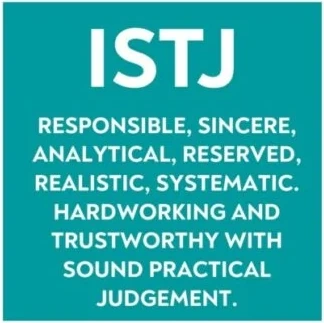
<< RESTART THE TEST – TOP OF PAGE
Your MBTI Profile:
ISFJ – The Defender 🛡️
Introverted-Sensing-Feeling-Judging
ISFJs are the compassionate guardians of tradition and wellbeing, silently ensuring the comfort and security of those around them. Making up about 14% of the population, they’re often the unsung heroes working behind the scenes. Notable ISFJs include Mother Teresa, Kate Middleton, and Rosa Parks—individuals who combined quiet strength with profound dedication to others.
With their exceptional observational skills, ISFJs pick up on subtle emotional cues and physical needs that others miss. They store these observations in their remarkable memory, remembering your favorite snack or meaningful date long after you’ve mentioned it once. ISFJs apply their practical intelligence to creating tangible expressions of care, from perfectly prepared meals to thoughtfully arranged living spaces.
Unlike more vocal types, ISFJs demonstrate their deep affection through consistent acts of service rather than grand declarations. Their quiet exterior often hides a rich inner emotional life and strongly held values they’ll defend ferociously when necessary.
STRONG POINTS 💪
Profound empathy – Genuinely understanding others’ emotional states
Meticulous attention to detail – Noticing what others overlook
Exceptional memory for personal details – Remembering preferences and history
Practical problem-solving – Finding realistic solutions to everyday challenges
Unwavering loyalty – Standing by their loved ones through any hardship
Patient persistence – Working steadily toward goals without fanfare
GROWTH AREAS 🌱
Difficulty saying “no” – Overcommitting to others’ needs
Absorbing others’ emotions – Taking on burdens that aren’t theirs
Reluctance to express needs – Suffering in silence rather than asking for help
Resistance to change – Preferring familiar discomfort to unknown improvements
Perfectionism – Setting exhausting standards for themselves
📚 Learning Style: Hands-on, practical learning with clear real-world applications
❤️ Love Language: Acts of service and quality time spent in comfortable, familiar settings
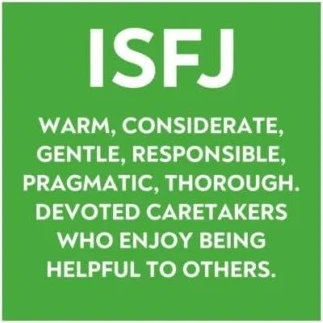
<< RESTART THE TEST – TOP OF PAGE
Your MBTI Profile:
INFJ – The Advocate 🔮
Introverted-Intuitive-Feeling-Judging
INFJs are the contemplative visionaries with humanitarian hearts, representing the rarest personality type at just 1-2% of the population. Their unique combination of deep empathy and strategic thinking creates individuals who not only understand human suffering but develop systematic solutions to address it. Famous INFJs include Martin Luther King Jr., Eleanor Roosevelt, and Carl Jung—each known for their profound insights into human nature and advocacy for positive change.
These complex individuals possess an almost supernatural ability to read between the lines, often understanding others better than they understand themselves. INFJs experience “doorslam” moments—when their patience finally exhausts, they may completely cut ties with those who repeatedly violate their deeply held values.
Behind their gentle exterior lies a steely determination that can surprise those who mistake their kindness for weakness. INFJs frequently experience the “paradox of connection”—deeply craving meaningful relationships while simultaneously needing significant alone time to recharge and process their complex inner world.
STRONG POINTS 💪
Visionary insight – Seeing patterns and possibilities others miss
Deep empathy – Intuitively understanding others’ emotional landscapes
Principled integrity – Unwavering commitment to personal values
Creative problem-solving – Finding unique approaches to human challenges
Inspiring leadership – Quietly motivating others toward meaningful goals
Deep listening – Creating spaces where others feel truly understood
GROWTH AREAS 🌱
Perfectionism – Setting impossibly high standards for themselves and others
Absorbing negative emotions – Taking on others’ pain as their own
Overthinking – Getting lost in complex mental labyrinths
Neglecting practical details – Missing immediate needs while focused on the future
Burnout vulnerability – Giving until completely depleted
🧠 Cognitive Function Stack: Introverted Intuition (Ni) → Extraverted Feeling (Fe) → Introverted Thinking (Ti) → Extraverted Sensing (Se)
🔄 Growth Path: Learning to set boundaries and accept imperfection while maintaining their visionary ideals
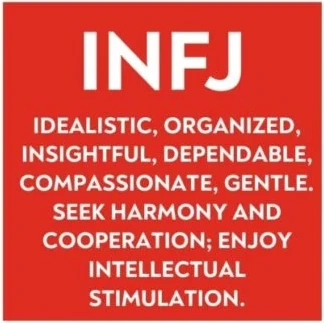
<< RESTART THE TEST – TOP OF PAGE
Your MBTI Profile:
INTJ – The Architect 🏗️
Introverted-Intuitive-Thinking-Judging
INTJs are the strategic masterminds who constantly reimagine and redesign the world around them. Making up just 2% of the population, they combine visionary thinking with methodical execution. Notable INTJs include Elon Musk, Michelle Obama, and Nikola Tesla—individuals who transformed abstract theories into world-changing realities.
These intellectual architects possess what seems like time travel, envisioning detailed futures and working backwards to create feasible pathways there. Their minds constantly generate systems improvements, often thinking several moves ahead while others are still deciding their first. The INTJ’s famous “death stare” isn’t intentional rudeness—it’s the visible manifestation of their mind dissecting complex concepts in real-time.
INTJs experience the “competency paradox”—holding themselves and others to exceedingly high standards while simultaneously harboring doubts about their own mastery. Despite their logical exterior, many INTJs nurture rich inner emotional worlds they selectively share with their small circle of trusted companions.
STRONG POINTS 💪
Strategic brilliance – Forecasting complex possibilities and contingencies
Intellectual curiosity – Never-ending pursuit of knowledge and understanding
Conceptual innovation – Creating original frameworks and systems
Analytical precision – Identifying logical inconsistencies instantly
Efficient execution – Streamlining processes to achieve maximum impact
Intellectual integrity – Pursuing truth regardless of personal preferences
GROWTH AREAS 🌱
Perceived aloofness – Coming across as cold or dismissive unintentionally
Impatience with inefficiency – Becoming frustrated with less systematic thinkers
Perfectionism – Setting impossibly high standards that inhibit progress
Overlooking emotional factors – Missing human elements in logical systems
Reluctance to delegate – Struggling to trust others with important tasks
🧠 Cognitive Function Stack: Introverted Intuition (Ni) → Extraverted Thinking (Te) → Introverted Feeling (Fi) → Extraverted Sensing (Se)
📈 Decision Making: Creating detailed contingency plans while maintaining focus on the ultimate objective
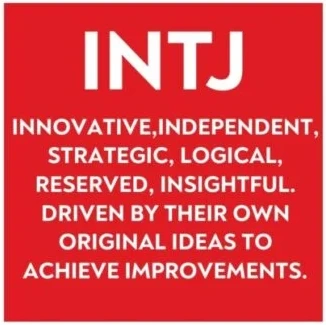
<< RESTART THE TEST – TOP OF PAGE
Your MBTI Profile:
ISTP – The Virtuoso 🛠️
Introverted-Sensing-Thinking-Perceptive
ISTPs are the masterful tacticians who excel in navigating the physical world with unmatched dexterity and analytical prowess. Making up about 5-6% of the population, they combine keen observation with practical problem-solving. Famous ISTPs include Bear Grylls, Clint Eastwood, and Michael Jordan—individuals who demonstrate exceptional skill in manipulating their physical environment under pressure.
These cool-headed pragmatists possess what some call “crisis calm”—becoming more focused and effective when emergencies arise while others panic. Their hands seem to possess an innate intelligence, instinctively understanding how to disassemble, repair, and optimize mechanical systems with minimal instruction. The ISTP’s famous “here and now” focus gives them an almost supernatural ability to respond to immediate circumstances.
ISTPs experience the “freedom paradox”—fiercely valuing their independence while simultaneously excelling in roles that require adherence to rigid protocols like military or emergency services. Their seemingly reckless stunts often hide carefully calculated risk assessments, as they’ve typically evaluated multiple variables before taking action.
STRONG POINTS 💪
Masterful troubleshooting – Solving practical problems with remarkable efficiency
Crisis management – Remaining calm and effective under extreme pressure
Technical proficiency – Understanding complex systems intuitively
Adaptability – Adjusting rapidly to changing conditions and requirements
Practical wisdom – Applying precise knowledge exactly when needed
Objectivity – Assessing situations without emotional bias
GROWTH AREAS 🌱
Emotional expression – Difficulty articulating feelings and needs
Long-term planning – Focusing on immediate solutions over future consequences
Relationship building – Sometimes appearing detached or unavailable
Following theoretical protocols – Impatience with procedures they deem inefficient
Risk management – Occasionally underestimating long-term dangers
Communication – Expressing complex thoughts in accessible language
🧠 Cognitive Function Stack: Introverted Thinking (Ti) → Extraverted Sensing (Se) → Introverted Intuition (Ni) → Extraverted Feeling (Fe)
🎮 Recreation Style: High-intensity physical activities that test limits and require technical mastery
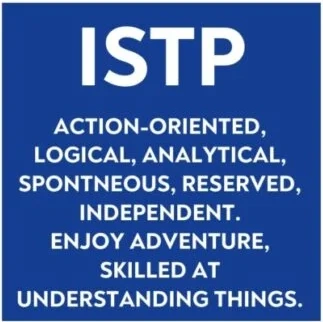
<< RESTART THE TEST – TOP OF PAGE
Your MBTI Profile:
ISFP – The Adventurer 🎨
Introverted-Sensing-Feeling-Perceptive
ISFPs are the gentle aesthetes who experience the world through a kaleidoscope of sensory impressions and deeply held personal values. Making up about 8-9% of the population, they combine artistic sensitivity with grounded practicality. Famous ISFPs include Bob Dylan, Frida Kahlo, and Michael Jackson—individuals who transformed their unique perspectives into transcendent art.
These compassionate creators possess what might be called “aesthetic intelligence”—an innate understanding of color, form, texture, and composition that cannot be taught. Their heightened sensory awareness allows them to notice subtle beauty that others miss entirely, from the interplay of light on water to the emotional undertones in a conversation. The ISFP’s famous “quiet intensity” reveals itself in passionate creative expression rather than verbose explanation.
ISFPs experience the “authenticity paradox”—maintaining fierce independence while simultaneously being deeply affected by others’ opinions of their creative expressions. Many ISFPs harbor a surprising adventurous streak, periodically seeking novel experiences that challenge their comfort zones and provide fresh sensory input for their artistic endeavors.
STRONG POINTS 💪
Artistic vision – Transforming ordinary materials into extraordinary expressions
Empathetic understanding – Connecting with others’ emotional experiences
Sensory intelligence – Noticing subtle aesthetic details others overlook
Authenticity – Unwavering commitment to personal values and expression
Adaptability – Flowing with changing circumstances gracefully
Practical creativity – Finding beautiful solutions to everyday problems
GROWTH AREAS 🌱
Conflict avoidance – Withdrawing rather than addressing issues directly
Difficulty with planning – Focusing on present moment over future preparation
Emotional vulnerability – Taking criticism of their work deeply personally
Reluctance to self-promote – Struggling to market their skills and talents
Self-doubt cycles – Questioning their abilities despite obvious talent
🧠 Cognitive Function Stack: Introverted Feeling (Fi) → Extraverted Sensing (Se) → Introverted Intuition (Ni) → Extraverted Thinking (Te)
🎨 Creative Process: Experimenting with materials hands-on rather than planning theoretical approaches
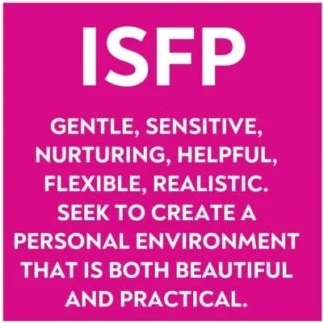
<< RESTART THE TEST – TOP OF PAGE
Your MBTI Profile:
INFP – The Mediator 💭
Introverted-Intuitive-Feeling-Perceptive
INFPs are the compassionate idealists whose rich inner worlds generate visions of human potential and spiritual depth. Representing about 4-5% of the population, they combine profound empathy with creative expression. Famous INFPs include J.R.R. Tolkien, Princess Diana, and John Lennon—individuals who channeled their idealism into works and actions that continue to inspire.
These gentle dreamers possess what might be called “emotional X-ray vision”—an ability to perceive the authentic core of people beneath social masks and defensive layers. Their imagination constantly generates alternative realities where human potential is fully realized and harmony prevails. The INFP’s famous “inner glow” emerges when discussing subjects aligned with their deeply held values and passions.
INFPs experience the “authenticity imperative”—feeling physically uncomfortable when forced to act in ways contradicting their core values. Many INFPs privately harbor a detailed fantasy world or imaginary realm that serves as both creative laboratory and emotional sanctuary from the harsher aspects of reality.
STRONG POINTS 💪
Moral integrity – Unwavering commitment to personal values
Emotional depth – Understanding complex human motivations and feelings
Creative vision – Imagining possibilities for human growth and connection
Empathetic listening – Creating safe spaces for authentic expression
Insight into others – Perceiving hidden potential and unspoken pain
Adaptability – Adjusting approach based on individual needs
GROWTH AREAS 🌱
Practical execution – Translating ideals into actionable steps
Setting boundaries – Protecting personal energy from others’ demands
External organization – Managing practical details and deadlines
Self-criticism – Holding themselves to impossible standards
Conflict management – Addressing tensions directly rather than avoiding
Balancing idealism – Reconciling perfect visions with imperfect reality
🧠 Cognitive Function Stack: Introverted Feeling (Fi) → Extraverted Intuition (Ne) → Introverted Sensing (Si) → Extraverted Thinking (Te)
✨ Inspiration Source: Finding meaning in personal experiences and translating them into universal themes
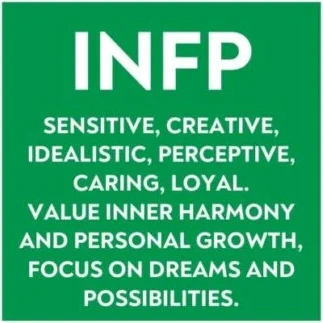
<< RESTART THE TEST – TOP OF PAGE
Your MBTI Profile:
INTP – The Logician 🧩
Introverted-Intuitive-Thinking-Perceptive
INTPs are the intellectual explorers whose minds continually dissect, analyze, and reimagine the fundamental structures of reality. Representing about 3-5% of the population, they combine conceptual creativity with rigorous logical analysis. Famous INTPs include Albert Einstein, Marie Curie, and Bill Gates—individuals who revolutionized our understanding of fundamental systems.
These deep thinkers possess what might be called “conceptual microscopes”—the ability to deconstruct ideas into their elemental components, identifying logical inconsistencies others miss entirely. Their minds generate endless theoretical models of how systems work, constantly refining and testing these frameworks against new information. The INTP’s famous “absent-minded professor” moments occur when they’re so deeply engaged with abstract concepts that practical realities temporarily fade from awareness.
INTPs experience the “clarity quest”—insatiably seeking precise understanding while simultaneously recognizing that complete certainty is theoretically impossible. Many INTPs develop encyclopedic knowledge in their areas of interest, driven by genuine curiosity rather than external validation or practical application.
STRONG POINTS 💪
Analytical brilliance – Deconstructing complex systems with precision
Conceptual creativity – Generating innovative theoretical frameworks
Intellectual honesty – Following logic regardless of personal preference
Objective problem-solving – Approaching challenges without emotional bias
Mental flexibility – Revising theories when new evidence emerges
Independent thinking – Developing original perspectives beyond conventional wisdom
GROWTH AREAS 🌱
Practical implementation – Translating theories into concrete action
Emotional expression – Articulating feelings and connecting with others
Attention to detail – Managing practical logistics and schedules
Project completion – Following through beyond the initial concept stage
Social awareness – Recognizing unspoken emotional dynamics
Communication clarity – Translating complex ideas for non-specialists
🧠 Cognitive Function Stack: Introverted Thinking (Ti) → Extraverted Intuition (Ne) → Introverted Sensing (Si) → Extraverted Feeling (Fe)
🔍 Learning Style: Conceptual understanding prioritized over rote memorization or practical application
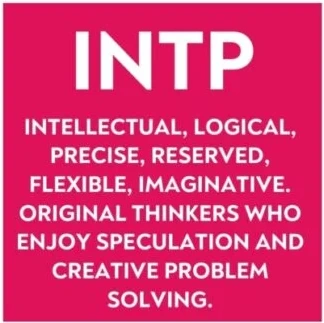
<< RESTART THE TEST – TOP OF PAGE
Your MBTI Profile:
ESTP – The Entrepreneur 🏄
Extraverted-Sensing-Thinking-Perceptive
ESTPs are the dynamic opportunists who masterfully navigate physical reality with unmatched tactical intelligence and risk-embracing confidence. Representing about 4-5% of the population, they combine keen observation with immediate action. Famous ESTPs include Winston Churchill, Madonna, and Donald Trump—individuals who confidently seize opportunities others hesitate to pursue.
These energetic tacticians possess what might be called “situational intelligence”—an uncanny ability to read rooms, assess resources, and identify leverage points in real-time. Their acute sensory awareness allows them to notice and capitalize on opportunities others completely miss. The ESTP’s famous “charm offensive” often disarms opposition through sheer charisma and force of personality.
ESTPs experience the “freedom imperative”—requiring autonomy to pursue emerging opportunities while simultaneously excelling in high-pressure environments with clear rules like competitive sports, business, or emergency response. Many ESTPs develop remarkable skill in physical activities, their minds and bodies operating as unified intelligence when navigating dynamic environments.
STRONG POINTS 💪
Tactical brilliance – Making optimal moves in rapidly changing situations
Persuasive communication – Winning others to their perspective naturally
Risk management – Calculating odds accurately in high-stakes scenarios
Energetic presence – Bringing vitality and motion to stagnant environments
Practical problem-solving – Finding immediate, workable solutions
Crisis management – Performing optimally under extreme pressure
GROWTH AREAS 🌱
Long-term planning – Considering distant consequences of current actions
Emotional sensitivity – Recognizing others’ feelings and unstated needs
Routine maintenance – Sustaining interest in established systems
Risk assessment – Sometimes underestimating long-term dangers
Patience with theory – Maintaining focus on abstract concepts
Impulse control – Resisting immediate temptations for greater rewards
🧠 Cognitive Function Stack: Extraverted Sensing (Se) → Introverted Thinking (Ti) → Extraverted Feeling (Fe) → Introverted Intuition (Ni)
🎲 Risk Profile: Calculated risk-taking based on real-time assessment rather than theoretical possibility
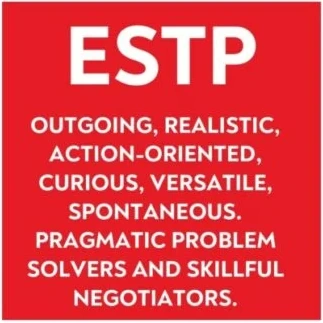
<< RESTART THE TEST – TOP OF PAGE
Your MBTI Profile:
ESFP – The Entertainer 🎭
Extraverted-Sensing-Feeling-Perceptive
ESFPs are the vibrant performers who transform everyday experiences into celebrations of sensory delight and emotional connection. Representing about 8-10% of the population, they combine infectious enthusiasm with practical resourcefulness. Famous ESFPs include Adele, Jamie Oliver, and Marilyn Monroe—individuals who captivate audiences with their authentic expressiveness and zest for life.
These charismatic enthusiasts possess what might be called “experiential intelligence”—an innate understanding of how to create memorable moments that engage all the senses. Their heightened awareness of their physical environment allows them to transform ordinary spaces into stages for meaningful connection. The ESFP’s famous “life of the party” energy masks a surprisingly deep need for authentic emotional exchange.
ESFPs experience the “present-moment paradox”—fully immersing themselves in immediate experience while simultaneously creating powerful emotional memories that last a lifetime. Many ESFPs develop remarkable skill in reading subtle physical cues, instantly detecting when someone feels uncomfortable or excluded and naturally adapting to include them.
STRONG POINTS 💪
Emotional intelligence – Reading and responding to others’ feelings naturally
Aesthetic awareness – Creating environments that delight the senses
Spontaneous problem-solving – Finding creative solutions with available resources
Authentic communication – Expressing themselves with refreshing honesty
Inclusive leadership – Making everyone feel valued and welcome
Practical compassion – Offering tangible help rather than abstract advice
GROWTH AREAS 🌱
Long-term planning – Considering distant consequences of current choices
Financial discipline – Resisting immediate gratification for future security
Focus maintenance – Sustaining attention on complex theoretical concepts
Receiving criticism – Taking feedback personally rather than objectively
Setting boundaries – Saying no to preserve personal energy
Systematic analysis – Breaking problems into component parts
🧠 Cognitive Function Stack: Extraverted Sensing (Se) → Introverted Feeling (Fi) → Extraverted Thinking (Te) → Introverted Intuition (Ni)
🎉 Social Style: Creating spontaneous shared experiences that forge lasting connections
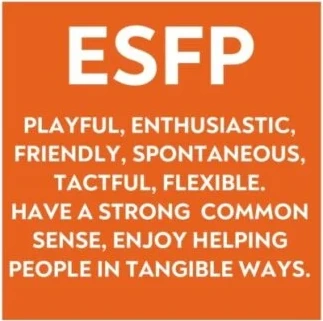
<< RESTART THE TEST – TOP OF PAGE
Your MBTI Profile:
ENFP – The Champion ✨
Extraverted-Intuitive-Feeling-Perceptive
ENFPs are the enthusiastic visionaries who see inspiring possibilities in both ideas and people, connecting disparate concepts and individuals with infectious energy. Representing about 7-8% of the population, they combine creative imagination with deep empathy. Famous ENFPs include Robin Williams, Walt Disney, and Ellen DeGeneres—individuals whose charismatic authenticity inspires others to embrace their unique potential.
These passionate catalysts possess what might be called “possibility vision”—spotting dormant talents and unrealized connections that others completely miss. Their minds continually generate novel ideas and scenarios, leading to the famous ENFP “shiny object syndrome” where each new possibility temporarily eclipses previous focuses. The ENFP’s renowned emotional contagion allows their enthusiasm to electrify entire rooms.
ENFPs experience the “authenticity imperative”—needing their outer actions to align with inner values while simultaneously craving novelty and exploration. Many ENFPs develop remarkable skill in improvisational speaking, weaving together seemingly unrelated concepts into meaningful narratives that inspire action and new perspectives.
STRONG POINTS 💪
Creative innovation – Generating original ideas and unexpected connections
Inspirational communication – Motivating others to pursue meaningful goals
Emotional intelligence – Reading and responding to others’ deeper needs
Adaptability – Pivoting strategies when circumstances change
People development – Seeing and nurturing others’ potential
Authentic leadership – Creating inclusive environments where diversity thrives
GROWTH AREAS 🌱
Follow-through – Maintaining focus on projects beyond initial enthusiasm
Practical details – Managing logistics, schedules, and systematic processes
Boundary setting – Protecting personal energy from others’ demands
Decision paralysis – Committing to choices when possibilities seem endless
Realistic assessment – Acknowledging practical limitations of grand visions
Emotional regulation – Managing intense feelings during setbacks
🧠 Cognitive Function Stack: Extraverted Intuition (Ne) → Introverted Feeling (Fi) → Extraverted Thinking (Te) → Introverted Sensing (Si)
💬 Communication Style: Enthusiastic storytelling that connects abstract ideas to human values
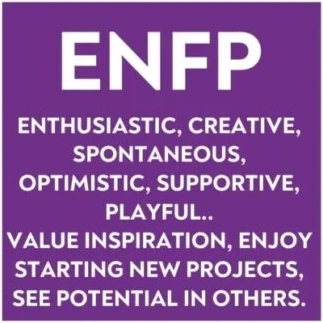
<< RESTART THE TEST – TOP OF PAGE
Your MBTI Profile:
ENTP – The Debater 💡
Extraverted-Intuitive-Thinking-Perceptive
ENTPs are the innovative challengers who delight in deconstructing established systems and reimagining possibilities through the lens of logical analysis. Representing about 3% of the population, they combine quick-witted creativity with strategic thinking. Famous ENTPs include Steve Jobs, Richard Feynman, and Jon Stewart—individuals who questioned conventional wisdom and proposed revolutionary alternatives.
These cerebral revolutionaries possess what might be called “conceptual alchemy”—transforming existing ideas into novel frameworks through unexpected connections and theoretical leaps. Their minds constantly generate alternative perspectives, leading to the famous ENTP “devil’s advocate” tendency where they’ll argue against their own position just to explore the intellectual territory. The ENTP’s renowned verbal agility allows them to articulate complex concepts with remarkable clarity and persuasive force.
ENTPs experience the “competence imperative”—needing to master underlying principles rather than just procedural knowledge while simultaneously craving novel intellectual challenges. Many ENTPs develop remarkable skill in improvisational debate, rapidly assembling compelling arguments from seemingly disparate facts and theoretical constructs.
STRONG POINTS 💪
Conceptual innovation – Generating groundbreaking frameworks and models
Strategic vision – Seeing multiple moves ahead in complex situations
Intellectual curiosity – Exploring diverse domains with genuine interest
Adaptable problem-solving – Finding creative solutions to complex challenges
Persuasive communication – Articulating ideas with compelling logic
Quick learning – Rapidly grasping new concepts and their implications
GROWTH AREAS 🌱
Implementation focus – Following through beyond the concept stage
Emotional awareness – Recognizing the impact of their words on others
Practical details – Managing logistical elements of projects
Patience with repetition – Maintaining interest in necessary routine tasks
Diplomatic communication – Softening critique when situations require tact
Decision commitment – Selecting a path when options seem equally valuable
🧠 Cognitive Function Stack: Extraverted Intuition (Ne) → Introverted Thinking (Ti) → Extraverted Feeling (Fe) → Introverted Sensing (Si)
🔄 Problem-Solving Style: Generating multiple innovative solutions rather than optimizing existing approaches
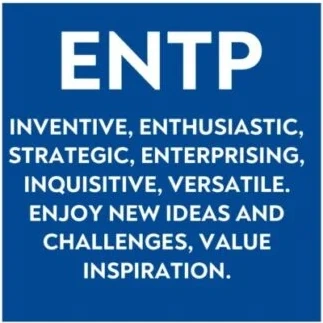
<< RESTART THE TEST – TOP OF PAGE
Your MBTI Profile:
ESTJ – The Executive 📊
Extraverted-Sensing-Thinking-Judging
ESTJs are the organized implementers who excel at creating efficient systems and maintaining reliable structures in a chaotic world. Representing about 8-12% of the population, they combine practical decisiveness with methodical efficiency. Famous ESTJs include Sheryl Sandberg, Judge Judy, and Colin Powell—individuals who create order through clear expectations and systematic approaches.
These methodical leaders possess what might be called “structural intelligence”—an innate understanding of how to organize people, resources, and processes to achieve reliable outcomes. Their minds excel at identifying inefficiencies and developing practical improvements to existing systems. The ESTJ’s renowned clarity of communication leaves little room for misinterpretation or procrastination.
ESTJs experience the “responsibility imperative”—feeling personally accountable for maintaining standards and fulfilling obligations while simultaneously setting high expectations for others. Many ESTJs develop remarkable skill in crisis management, their decisive leadership providing stability precisely when chaos threatens to overwhelm more uncertain personalities.
STRONG POINTS 💪
Organizational excellence – Creating efficient systems that deliver reliable results
Decisive leadership – Making clear decisions without unnecessary delay
Practical implementation – Translating ideas into actionable steps
Responsibility fulfillment – Consistently meeting and exceeding obligations
Clear communication – Articulating expectations with minimal ambiguity
Crisis management – Providing stability during turbulent situations
GROWTH AREAS 🌱
Emotional awareness – Recognizing feelings as valid data points
Flexibility with change – Adapting to unexpected shifts in plans
Comfort with ambiguity – Navigating situations without clear precedents
Innovation openness – Considering radical alternatives to established methods
Diplomatic criticism – Delivering feedback with supportive framing
Perspective-taking – Seeing situations through others’ subjective lenses
🧠 Cognitive Function Stack: Extraverted Thinking (Te) → Introverted Sensing (Si) → Extraverted Intuition (Ne) → Introverted Feeling (Fi)
🎯 Goal Orientation: Setting clear objectives with specific metrics and systematic implementation plans
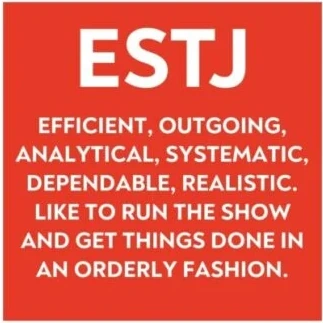
<< RESTART THE TEST – TOP OF PAGE
Your MBTI Profile:
ESFJ – The Consul 💐
Extraverted-Sensing-Feeling-Judging
ESFJs are the thoughtful harmonizers who create warmth and belonging through practical care and social orchestration. Representing about 12% of the population, they combine interpersonal awareness with organizational skill. Famous ESFJs include Taylor Swift, Bill Clinton, and Jennifer Garner—individuals who connect with others while maintaining social structures.
These compassionate organizers possess what might be called “relational intelligence”—an instinctive understanding of group dynamics and individual needs that allows them to foster harmony and inclusion. Their remarkable memory for personal details—birthdays, preferences, family connections—creates a foundation for meaningful interactions. The ESFJ’s renowned hospitality transforms ordinary gatherings into memorable experiences where everyone feels valued.
ESFJs experience the “connection imperative”—feeling personally responsible for others’ emotional wellbeing while simultaneously seeking affirmation through their service. Many ESFJs develop remarkable skill in anticipating practical needs, often addressing problems before others even recognize them.
STRONG POINTS 💪
Interpersonal warmth – Creating environments where people feel welcomed
Practical caretaking – Anticipating and addressing tangible needs
Social organization – Coordinating events that strengthen community bonds
Emotional attunement – Reading and responding to others’ emotional states
Traditional stewardship – Preserving and passing on valuable customs
Reliable follow-through – Consistently fulfilling commitments
GROWTH AREAS 🌱
Handling criticism – Taking feedback as personal rejection
Conflict avoidance – Prioritizing harmony over necessary confrontation
Embracing change – Adapting to shifts in established social structures
Self-prioritization – Neglecting personal needs while caring for others
Emotional boundaries – Absorbing others’ problems as personal burdens
Decision confidence – Trusting personal judgment when others disagree
🧠 Cognitive Function Stack: Extraverted Feeling (Fe) → Introverted Sensing (Si) → Extraverted Intuition (Ne) → Introverted Thinking (Ti)
❤️ Love Language: Acts of service and quality time spent in harmonious, structured activities
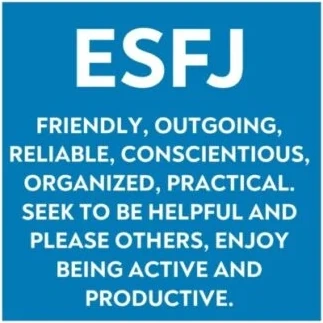
<< RESTART THE TEST – TOP OF PAGE
Your MBTI Profile:
ENFJ – The Protagonist 🌟
Extraverted-Intuitive-Feeling-Judging
ENFJs are the charismatic catalysts who inspire collective action through their compelling vision of human potential and connection. Representing about 2-3% of the population, they combine empathetic insight with organizational leadership. Famous ENFJs include Barack Obama, Oprah Winfrey, and Nelson Mandela—individuals who mobilized others toward shared ideals and meaningful change.
These inspiring mentors possess what might be called “developmental intelligence”—an extraordinary ability to recognize others’ potential and create pathways for growth and contribution. Their minds naturally connect individual strengths with larger purpose, crafting roles where people can thrive while advancing collective goals. The ENFJ’s renowned charismatic presence creates an almost magnetic pull toward their vision of possibility.
ENFJs experience the “harmonious impact paradox”—deeply valuing both interpersonal harmony and transformative change that often requires disruption. Many ENFJs develop remarkable skill in organizational transformation, intuitively navigating complex human dynamics to shift cultures toward greater authenticity and purpose alignment.
STRONG POINTS 💪
Inspirational leadership – Motivating others toward meaningful contribution
Empathetic insight – Understanding others’ emotional needs and aspirations
Strategic communication – Crafting messages that resonate and mobilize
Community building – Creating spaces where diverse individuals connect
Talent development – Recognizing and nurturing others’ potential
Ethical conviction – Maintaining principled action aligned with values
GROWTH AREAS 🌱
People-pleasing tendencies – Accommodating others at personal cost
Emotional boundaries – Absorbing others’ emotional states and problems
Perfectionism – Setting impossibly high standards for self and projects
Burnout vulnerability – Giving beyond sustainable personal capacity
Excessive responsibility – Taking ownership of others’ choices
Conflict avoidance – Prioritizing harmony over necessary confrontation
🧠 Cognitive Function Stack: Extraverted Feeling (Fe) → Introverted Intuition (Ni) → Extraverted Sensing (Se) → Introverted Thinking (Ti)
🎯 Leadership Style: Values-driven guidance that inspires authentic contribution toward meaningful vision
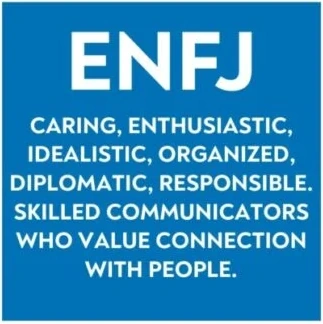
<< RESTART THE TEST – TOP OF PAGE
Your MBTI Profile:
ENTJ – The Commander 🏆
Extraverted-Intuitive-Thinking-Judging
ENTJs are the strategic commanders who transform visionary possibilities into executable systems through decisive leadership and methodical implementation. Representing about 2% of the population, they combine long-range thinking with efficient action. Famous ENTJs include Margaret Thatcher, Steve Jobs, and Gordon Ramsay—individuals who drove transformative change through unwavering vision and structured execution.
These visionary implementers possess what might be called “systems intelligence”—an extraordinary ability to envision improved structures and mobilize resources to create them. Their minds naturally identify inefficiencies in existing frameworks while simultaneously generating strategic pathways to superior alternatives. The ENTJ’s renowned decisiveness cuts through ambiguity with remarkable clarity, creating momentum where others remain paralyzed by uncertainty.
ENTJs experience the “efficiency-innovation paradox”—valuing both optimized systems and disruptive improvements that temporarily reduce efficiency. Many ENTJs develop remarkable skill in strategic planning, mapping complex interconnected factors while maintaining focus on ultimate objectives through various contingencies.
STRONG POINTS 💪
Strategic vision – Forecasting long-range possibilities and pathways
Decisive leadership – Making clear judgments without unnecessary delay
Systems thinking – Understanding how components interact within larger frameworks
Efficiency optimization – Streamlining processes for maximum impact
Intellectual honesty – Pursuing truth regardless of personal preference
Resource mobilization – Aligning people and assets toward strategic goals
GROWTH AREAS 🌱
Emotional awareness – Recognizing feelings as valid information sources
Interpersonal sensitivity – Moderating directness with diplomacy
Patience with process – Allowing necessary developmental stages
Work-life balance – Maintaining personal renewal amid intense focus
Delegating control – Trusting others with important responsibilities
Receiving feedback – Opening to input that challenges assumptions
🧠 Cognitive Function Stack: Extraverted Thinking (Te) → Introverted Intuition (Ni) → Extraverted Sensing (Se) → Introverted Feeling (Fi)
🎯 Decision Process: Rapidly evaluating options against strategic objectives with contingency planning
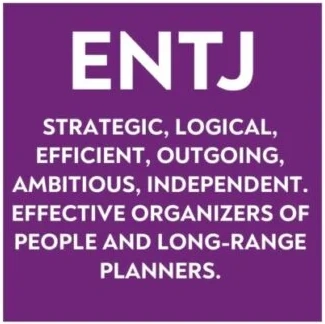
<< RESTART THE TEST – TOP OF PAGE
